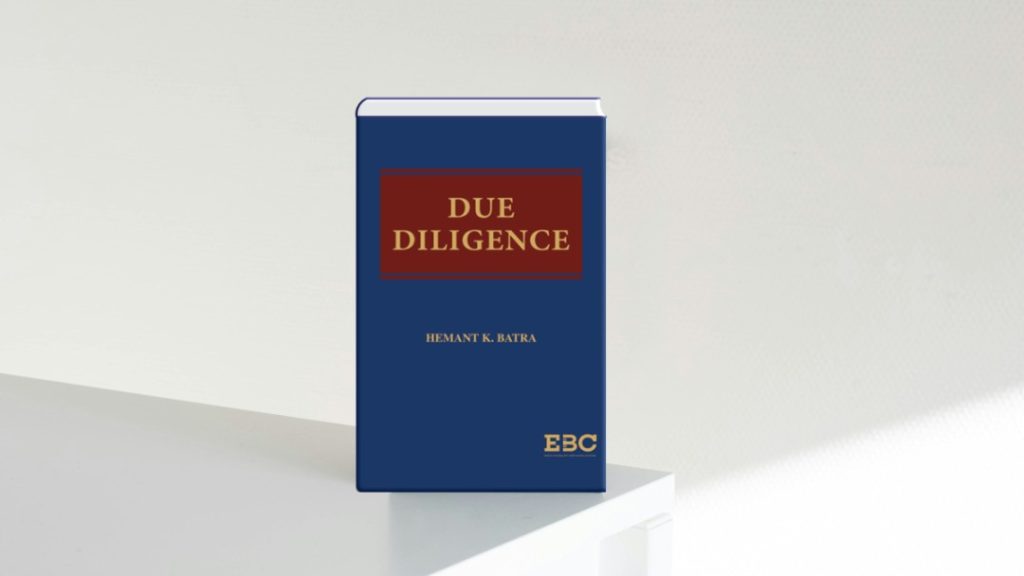
Due diligence is one of the most critical legal processes in corporate law. It involves a detailed investigation and evaluation of a business or entity before entering into a formal agreement, especially in mergers and acquisitions (M&A), investments, or significant transactions. This process helps minimize risk, ensure compliance, and uncover hidden liabilities.
What is Due Diligence?
In simple terms, due diligence is the legal and financial audit of a company or transaction. It is a structured process where relevant information and documents are examined to assess the company’s health, legality, compliance status, and potential risks. It allows the buyer, investor, or acquirer to make informed decisions, assess the valuation, and plan for post-transaction integration or risk mitigation.
Importance of Due Diligence in Corporate Law
Due diligence plays a vital role in:
- Risk assessment: Identifies potential legal, financial, and regulatory risks.
- Valuation: Confirms whether the target company’s value is accurate.
- Legal compliance: Ensures the company complies with applicable laws and regulations.
- Liability management: Detects contingent liabilities, pending litigations, and contractual obligations.
- Negotiation support: Helps parties renegotiate deal terms based on findings.
Types of Due Diligence in Corporate Law
1. Legal Due Diligence
This focuses on the legal aspects of the target company, including:
- Corporate structure and governance documents (e.g. MoA, AoA)
- Regulatory and statutory compliance (Companies Act, 2013)
- Existing and potential litigation
- Intellectual property rights
- Contracts and agreements
- Employment and labor law compliance
2. Financial Due Diligence
Analyzes the company’s financial health through:
- Financial statements and audits
- Tax records and filings
- Debt and credit history
- Revenue trends and projections
3. Operational Due Diligence
Focuses on:
- Business processes
- Supply chain efficiency
- Management team competence
- IT infrastructure
4. Environmental, Social, and Governance (ESG) Due Diligence
Increasingly important, particularly for global or impact-driven investments, this assesses:
- Environmental law compliance
- CSR obligations (as per Section 135 of the Companies Act, 2013)
- Human rights and labor policies
- Governance practices
Relevant Indian Laws and Legal Frameworks
Several laws guide and impact the due diligence process in India, including:
➤ Companies Act, 2013
- Governs corporate governance, management, auditor reports, and financial disclosures.
- Sections like 129 (financial statements), 134 (Board’s report), and 186 (loans and investments) are often examined.
➤ Securities and Exchange Board of India (SEBI) Regulations
- SEBI (LODR) Regulations, 2015 – For listed companies.
- SEBI (SAST) Regulations, 2011 – In cases of takeovers and substantial acquisitions.
- SEBI (ICDR) Regulations – During public offerings and rights issues.
➤ Income Tax Act, 1961
- For checking tax compliance, pending tax litigations, and undisclosed liabilities.
➤ Competition Act, 2002
- Essential for large M&A deals requiring clearance from the Competition Commission of India (CCI).
➤ Insolvency and Bankruptcy Code (IBC), 2016
- Relevant when the target company is undergoing insolvency resolution.
- Resolution applicants are expected to carry out due diligence of distressed assets.
➤ Foreign Exchange Management Act (FEMA), 1999
- If foreign investment or cross-border transactions are involved, FEMA compliance is checked.
➤ Intellectual Property Laws
- For evaluating IP ownership, trademarks, patents, and related rights (Trade Marks Act, 1999; Patents Act, 1970).
Process of Conducting Due Diligence
Due diligence typically follows these steps:
1. Planning and Scope Definition
- Identify the nature and purpose of the transaction.
- Define the depth and breadth of due diligence needed.
2. Document Review
- Analyze corporate, legal, financial, HR, and operational documents.
- Use virtual data rooms for secure and organized review.
3. Interviews and Site Visits
- Speak with key stakeholders and assess on-ground realities.
4. Risk Analysis and Red Flag Identification
- Summarize issues like pending litigation, compliance gaps, or financial misstatements.
5. Due Diligence Report
- A final, structured report is submitted highlighting findings, risks, and recommendations.
Key Documents Checked During Due Diligence
- Certificate of incorporation and constitutional documents (MoA, AoA)
- Shareholding structure and cap tables
- Financial statements and audit reports
- Tax filings and assessments
- Employment contracts and HR policies
- Licenses, approvals, and registrations
- Ongoing and past litigation documents
- Loan and financing agreements
- Intellectual property registrations
Confidentiality and Non-Disclosure Agreements (NDAs)
Before sharing sensitive documents, parties often sign NDAs to ensure that information disclosed during due diligence remains confidential. This protects trade secrets, IP, and financial data from misuse.
Legal Consequences of Poor Due Diligence
Failure to conduct proper due diligence can lead to:
- Acquisition of hidden liabilities or non-compliant businesses
- Regulatory penalties
- Post-deal disputes and litigation
- Financial losses and reputational damage
Thus, thorough due diligence is not just best practice—it is a legal safeguard.
If you’d like a practical and in‑depth guide to due diligence from a corporate law perspective, you should check out Due Diligence by Hemant K. Batra, published by EBC. It is available in hardback and ebook formats and covers the meaning, process, reporting, and real‑world examples of due diligence.
















